Interviewing Skills For Managers Course in Singapore
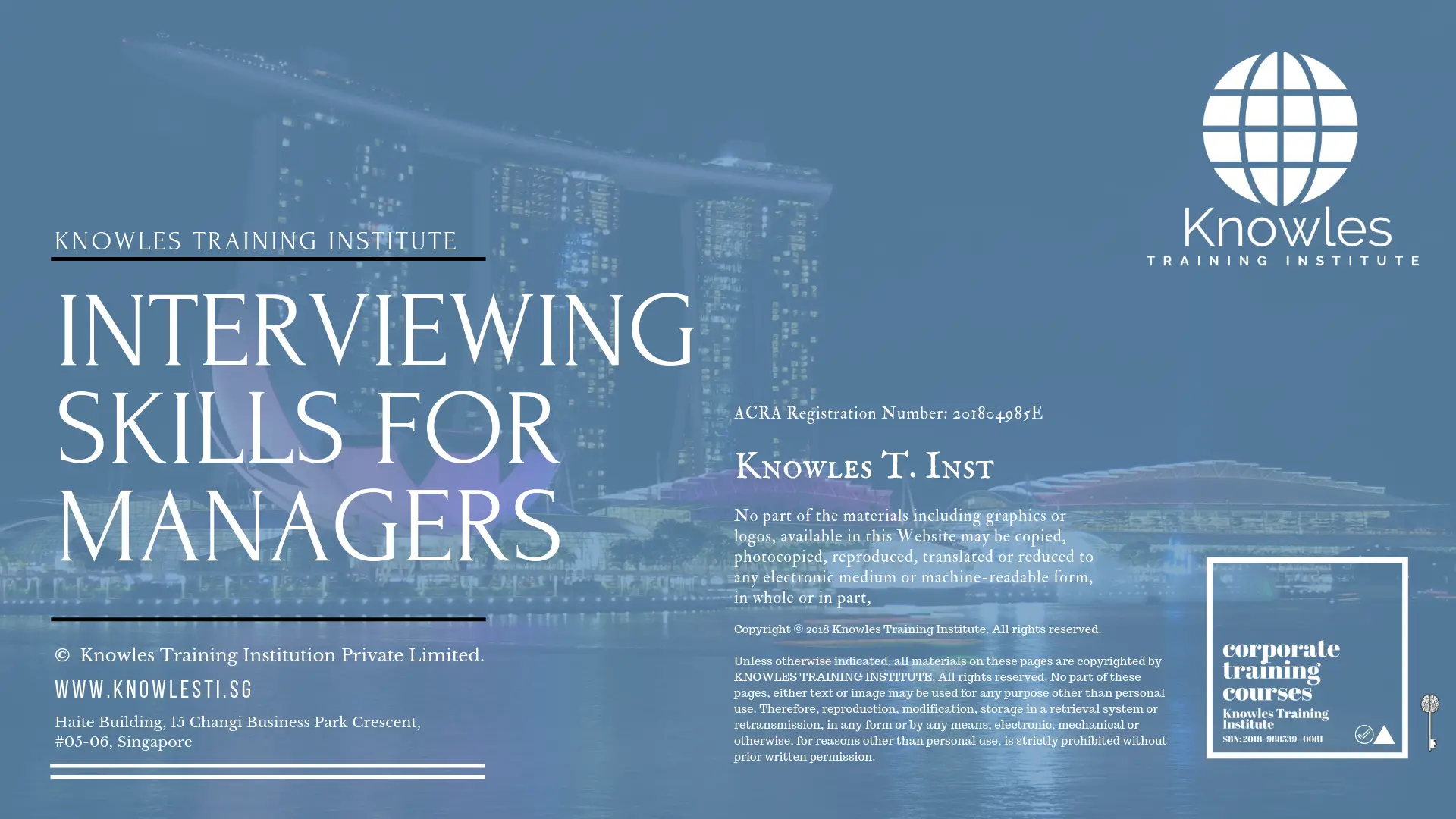
About This Interviewing Skills For Managers Training Course
Interviewing Skills For Managers Course in Singapore
Having skills in interviewing will help managers uncover more than just the bare minimum of information from the interviewee. The interviewers must know how to use body language to its full advantage. They should possess eloquence in asking the right questions without coming out too strong or too offensive.
Who Should Attend This Interviewing Skills For Managers Workshop
This Interviewing Skills For Managers workshop is ideal for anyone who would like to gain a strong grasp and improve their Interviewing Skills For Managers.
All Staff Within An Organisation
Managers
Team Leaders
Executives
Assistants
Officers
Secretaries
Group Size For This Interviewing Skills For Managers Training Program
The ideal group size for this Interviewing Skills For Managers course is:
Minimum: 5 Participants
Maximum: 15 Participants
Course Duration For This Interviewing Skills For Managers Skills Course
The duration of this Interviewing Skills For Managers workshop is 2 full days. Knowles Training Institute will also be able to contextualised this workshop according to different durations; 3 full days, 1 day, half day, 90 minutes and 60 minutes.
2 Full Days
9 a.m to 5 p.m
Interviewing Skills For Managers Course Benefits
Below is the list of course benefits of our Interviewing Skills For Managers course
- Manage the recruitment process more effectively for an easier process in future recruitments
- Interview candidates with confidence to avoid them intimidating or undermining you as a recruiter/interviewer
- Get the right person for the job because the whole recruitment process is precise and functional enough
- Avoid the most common interviewing mistakes and apply changes to never make them in the future
- Apply behavioral-based interview techniques to make better hiring decisions and hire the best employees
- Avoid breaking employment laws during the interview process by equipping yourself with the knowledge needed
- Use techniques for interviewing that uncover a candidate’s work attitude and break down their defense mechanisms
- Develop and ask great interview questions to uncover a candidate’s real skills and capabilities that may be of use for the company in the future
- Learn how to present company to candidates that leaves them positive about the company
- Apply a step-by-step interview plan to ensure success with the hiring pool and make better hiring judgments
- Follow human resource processes to avoid any form of discrimination and/or conflict
- Document the interview by focusing on descriptions and facts, not judgments and opinions
Interviewing Skills For Managers Course Objectives
Below is the list of course objectives of our Interviewing Skills For Managers course
- Describe what one needs to achieve success when being interviewed for a job that one really wants to be accepted in
- Identify the candidate who best fits the needs of the job, the department and the organization
- Understand the laws that apply to the interview process and equip yourself with knowledge to get ahead but also abide by the process
- Write an effective and clear advert for websites, job sites, and social media to attract the right people for the job
- Understand how to structure questions that find out the right kind of information about the applicants to gain adequate knowledge about them
- Recognize the importance of carrying out skills tests for all job roles to really know who the right and worthy candidates are
- Recognize the importance of hiring for attitude because skills can still be developed but attitude is something that cannot be changed easily
- Understand how to evaluate candidates and make the right decision to avoid wasting company time in the hiring and recruitment process
- Understand how to extend an offer as well as politely reject the wrong people
- Understand how to make the disciplinary and dismissal process fair and legal to everyone who applied
- Gain insight into making exit, performance, and return to work interviews productively and appropriately
- Turn the process into a well-conceived and executed managerial decision that the company will benefit from in the future
Course Content For This Interviewing Skills For Managers Training Course
Below is the list of course content of our Interviewing Skills For Managers training course
- Understanding the need for job analysis, a process to identify and determine in detail the particular job duties and requirements and the relative importance of these duties for a given job
- Defining essential functions and hiring criteria to inform candidates on what the company is really looking for
- Your managerial and recruitment responsibilities before and during the interview that would make the whole process more cohesive
- Know how to avoid charges of intentional or unintentional discrimination by being fair and neutral during the whole recruitment process
- Building rapport with the candidate and omit the possibility of having an awkward exchange
- Asking the right questions to really get the answers that you want out of the candidate who is also a future employee of the company
- Being fair and transparent to avoid any confusion and/or miscommunication with the applicants
- Using all the various types of questions to get past a reluctant candidate’s defense mechanisms
- Body language is the process of communicating nonverbally through conscious or unconscious gestures and movements
- Active listening is fully concentrating on what is being said rather than just passively ‘hearing’ the message of the speaker.
- Warning signs that tell you the candidate is not what you are looking for to avoid hiring the wrong ones for your company
- Selecting the right person for the job – evaluating and comparing worthy candidates
Interviewing Skills For Managers Value Added Materials
Each participant will receive the following materials for the Interviewing Skills For Managers course
Interviewing Skills For Managers Learner’s Guide
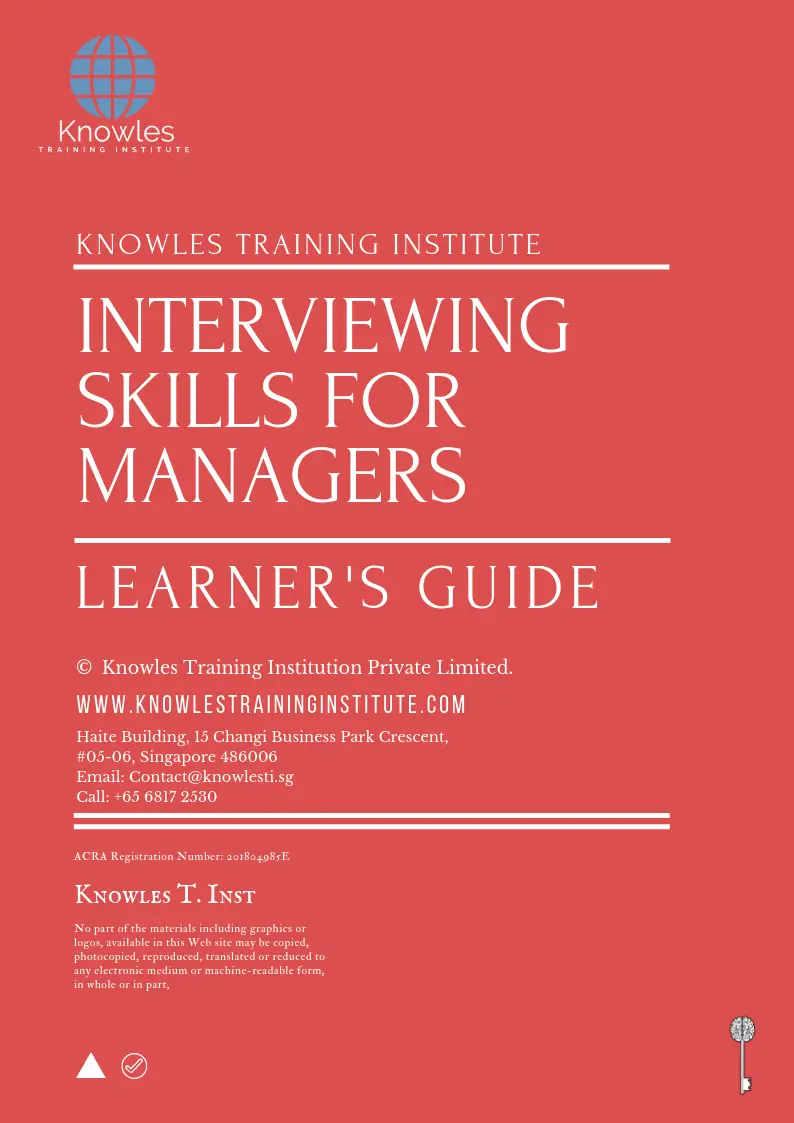
Interviewing Skills For Managers Key Takeaways Notes
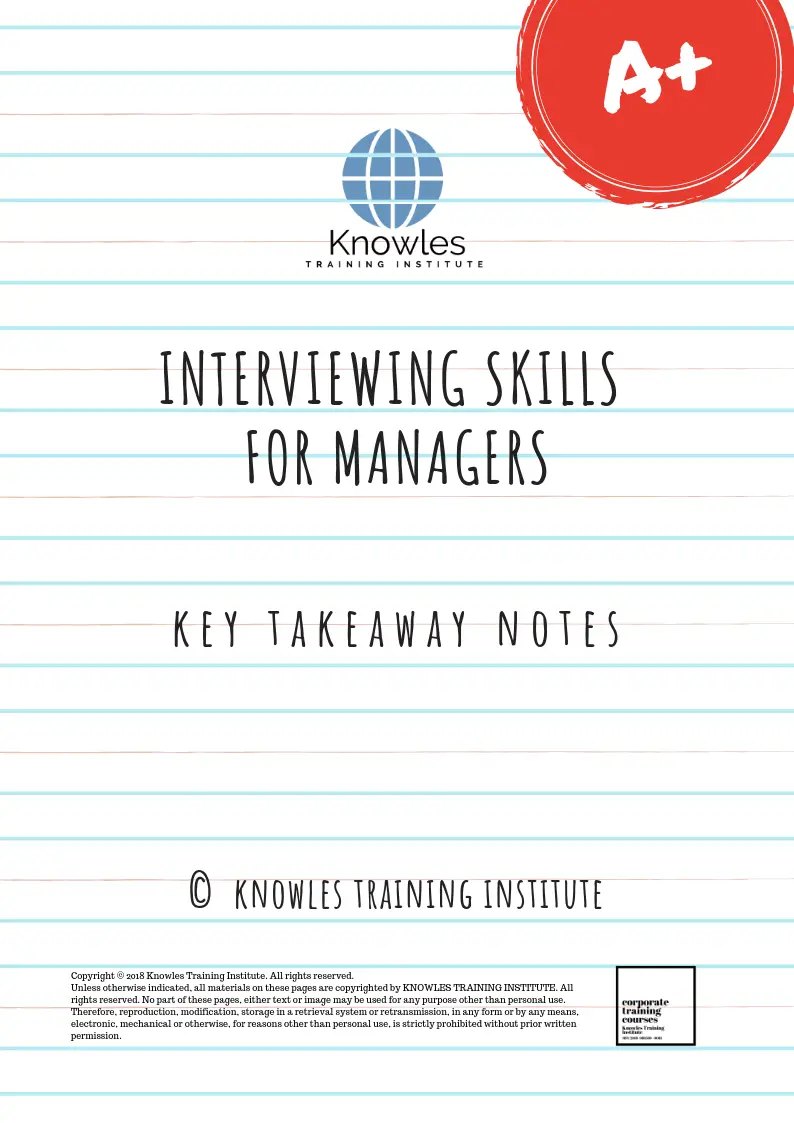
Interviewing Skills For Managers Essentials Ebook
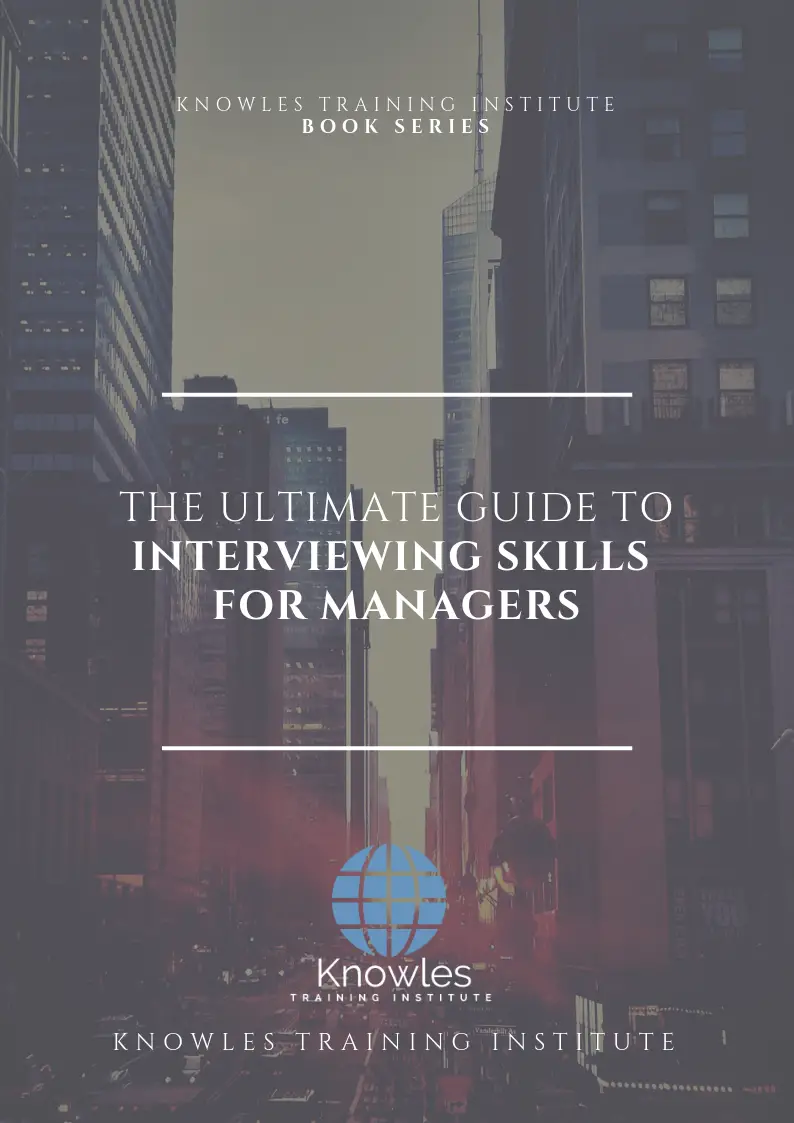
Interviewing Skills For Managers Course Handouts
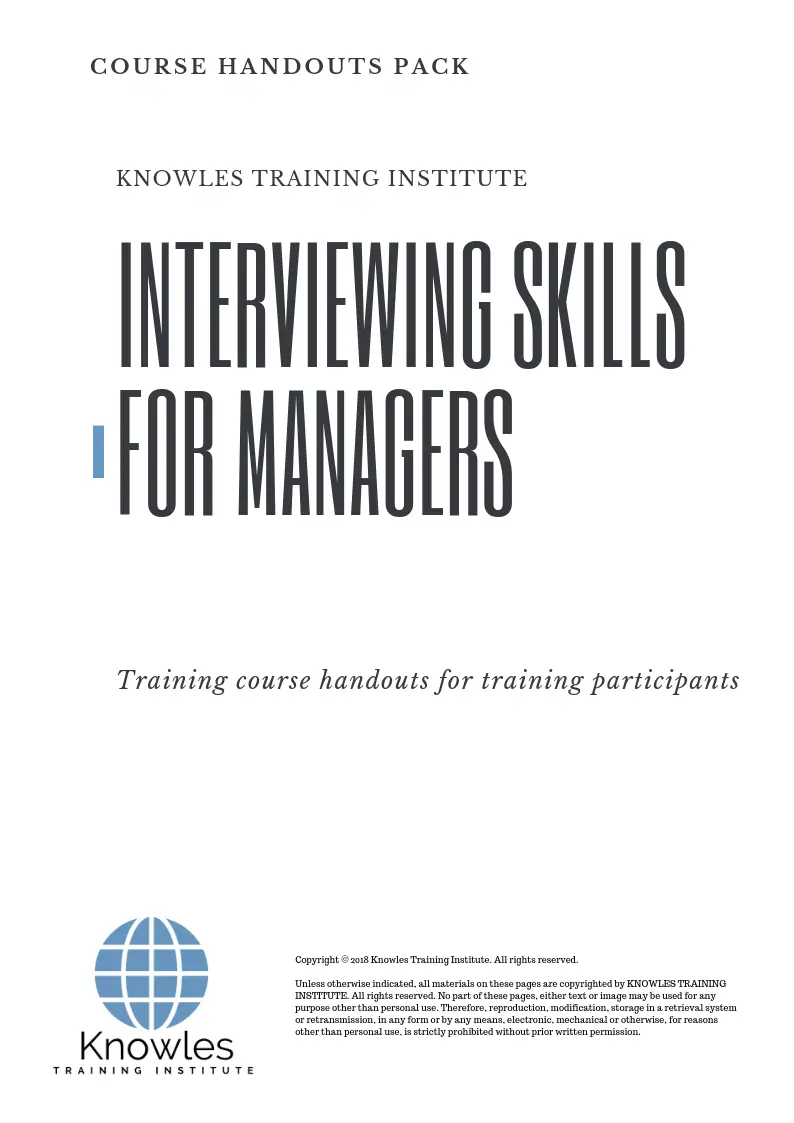
Interviewing Skills For Managers 30-Day Action Plan
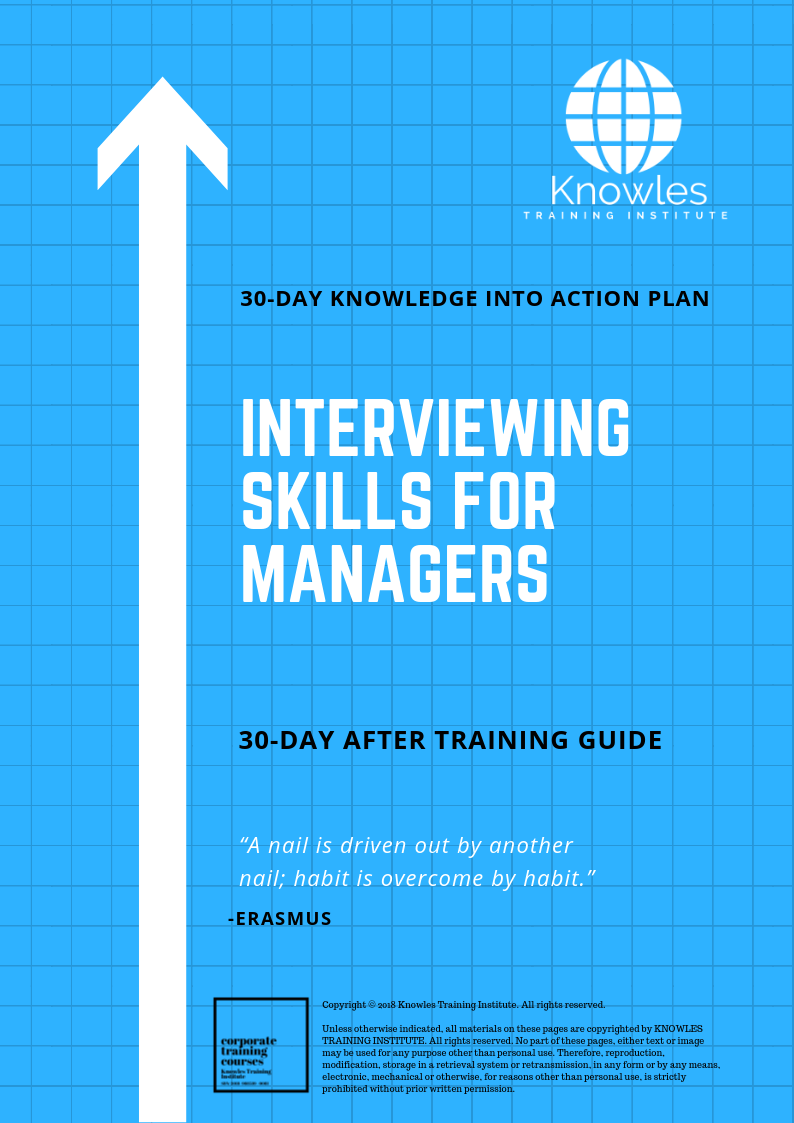
Interviewing Skills For Managers MindMaps Pack
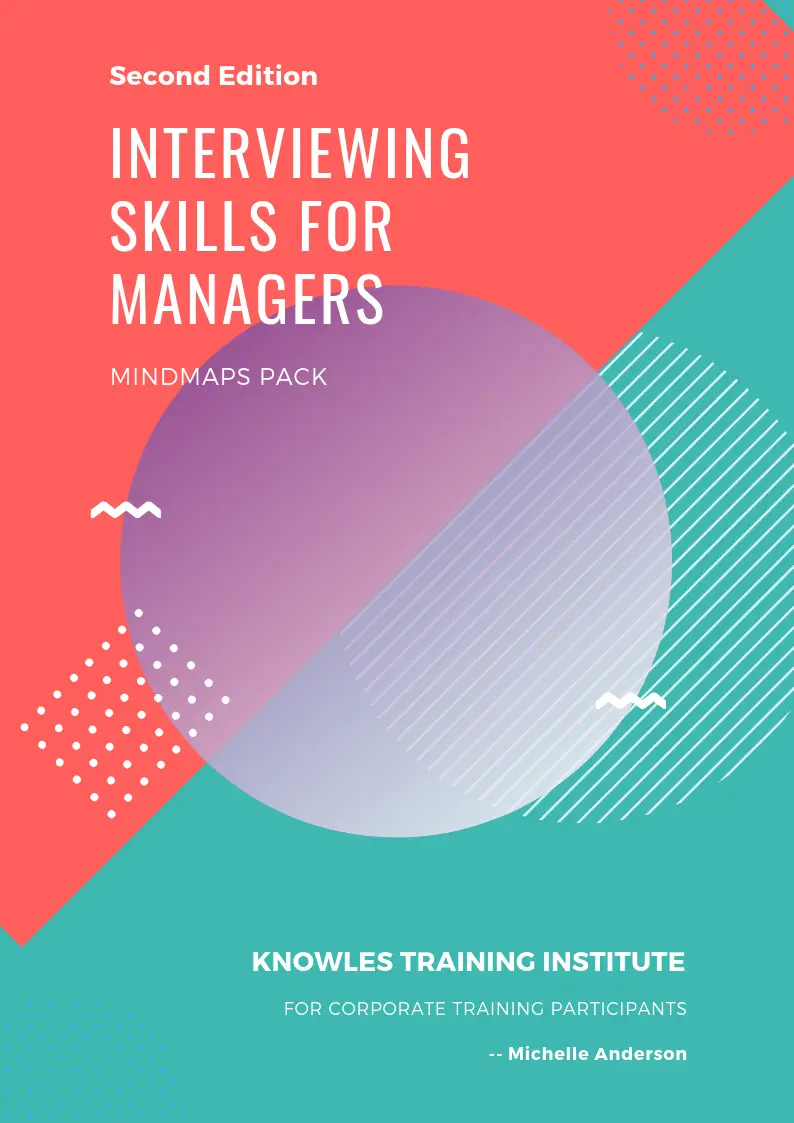
Interviewing Skills For Managers PPT Slides Used During Course
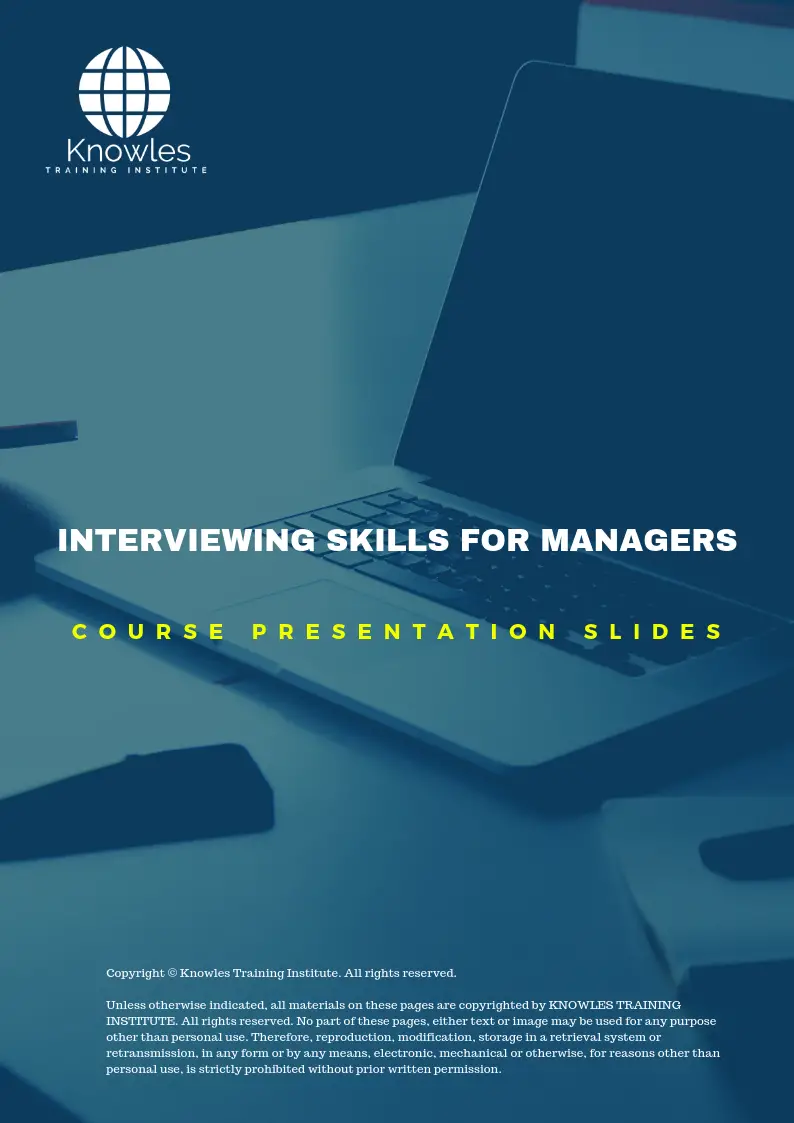
Interviewing Skills For Managers Long-Term Memory Flashcards Pack
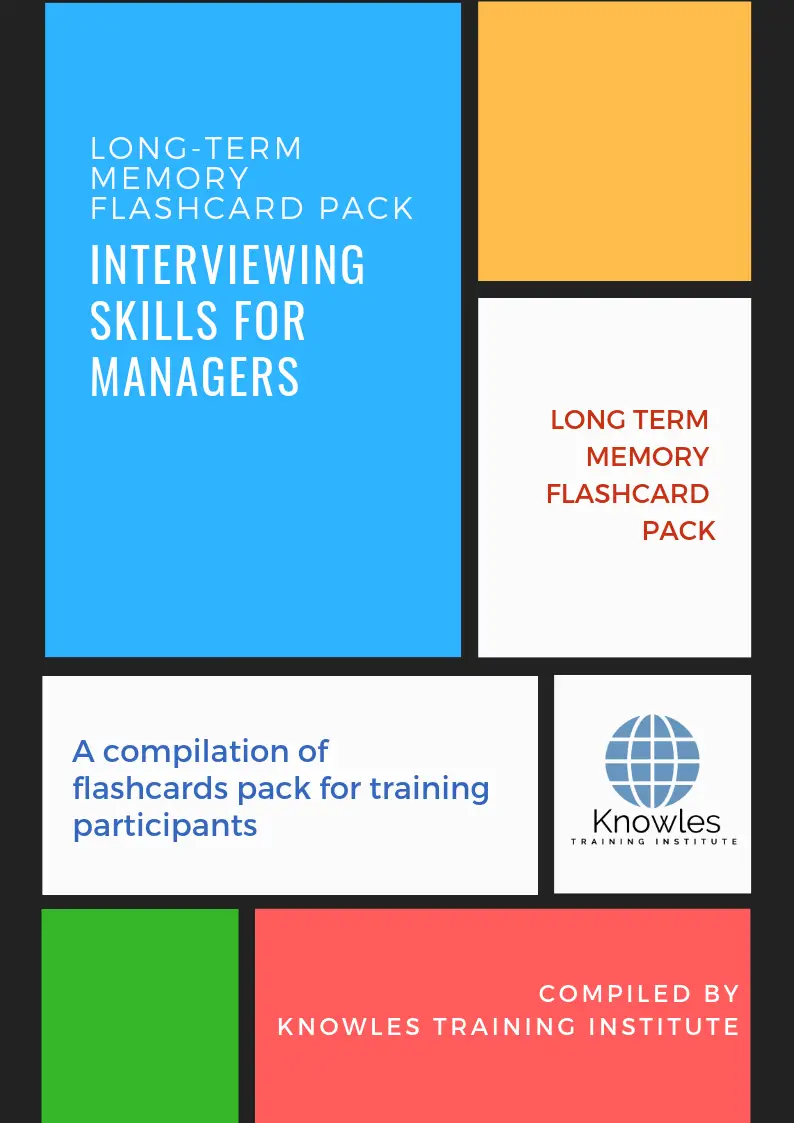
Interviewing Skills For Managers E-Learning Course
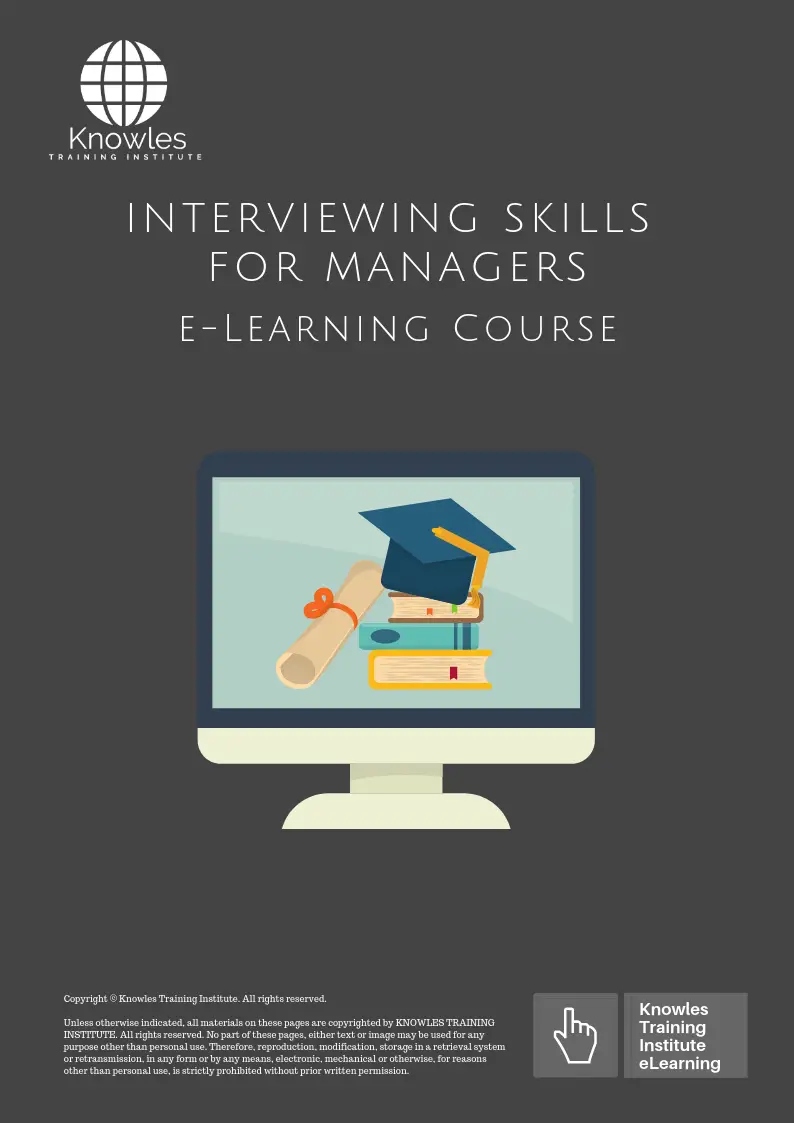
Interviewing Skills For Managers Online Video Course
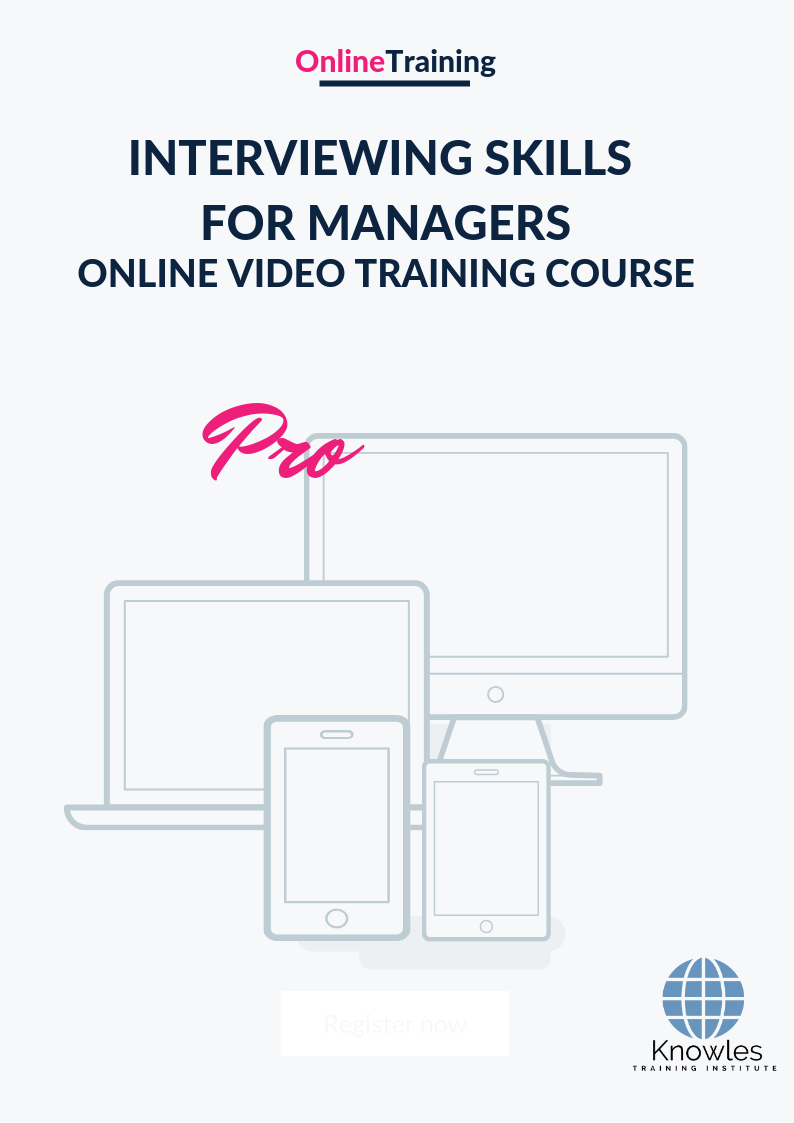
Interviewing Skills For Managers Essentials Audiobook
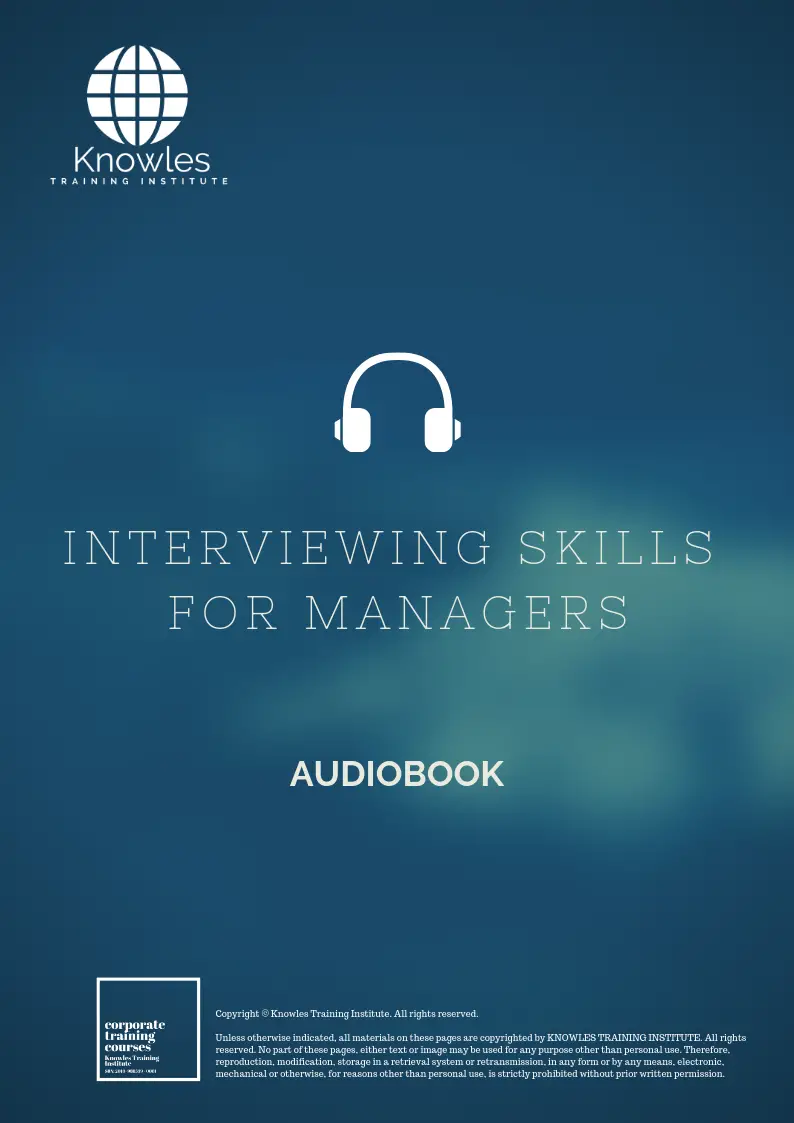
Interviewing Skills For Managers Infographics Pack
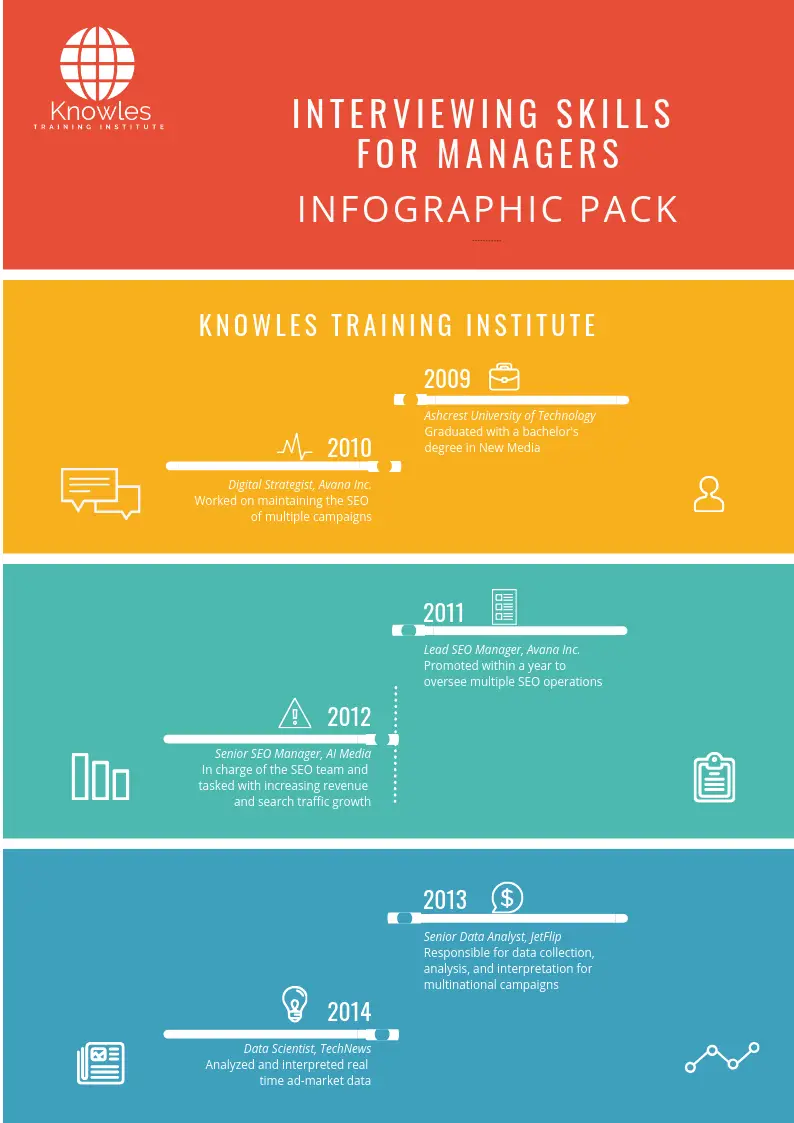
Interviewing Skills For Managers Certification
Each course participant will receive a certification of training completion
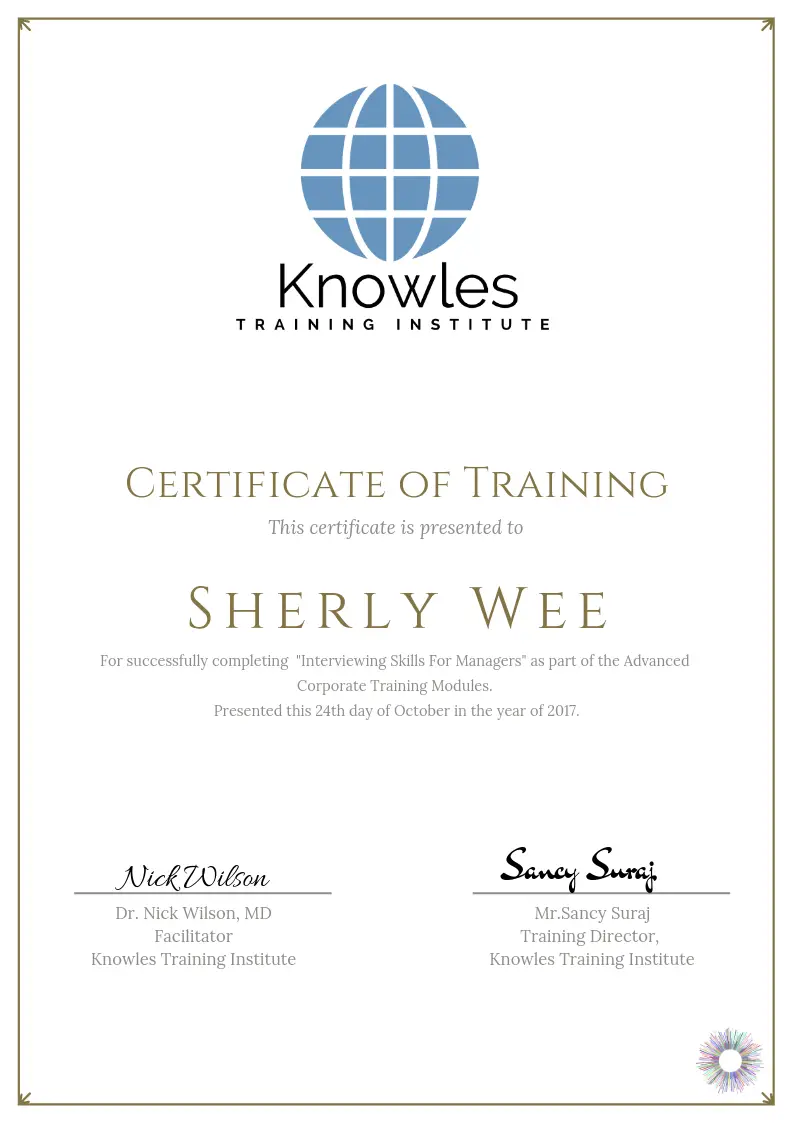
Course Fees
There are 3 pricing options available for this Interviewing Skills For Managers training course. Course participants not in Singapore may choose to sign up for our online Interviewing Skills For Managers training course.
SGD 1,334.96 For a 60-minute Lunch Talk Session.
SGD 584.96 For Half Day Course Per Participant.
SGD 884.96 For 1 Day Course Per Participant.
SGD 1,184.96 For 2 Day Course Per Participant.
Discounts available for more than 2 participants.
Course Discounts, Fundings & Subsidies
We have the following discounts, fundings & subsidies for this Interviewing Skills For Managers training course

Upcoming Interviewing Skills For Managers Training Course Schedule
Contact us for the latest Interviewing Skills For Managers course schedules:
Phone: +65 6714 6663
Email: contact@knowlesti.com
Message:
Download Interviewing Skills For Managers Course Brochure
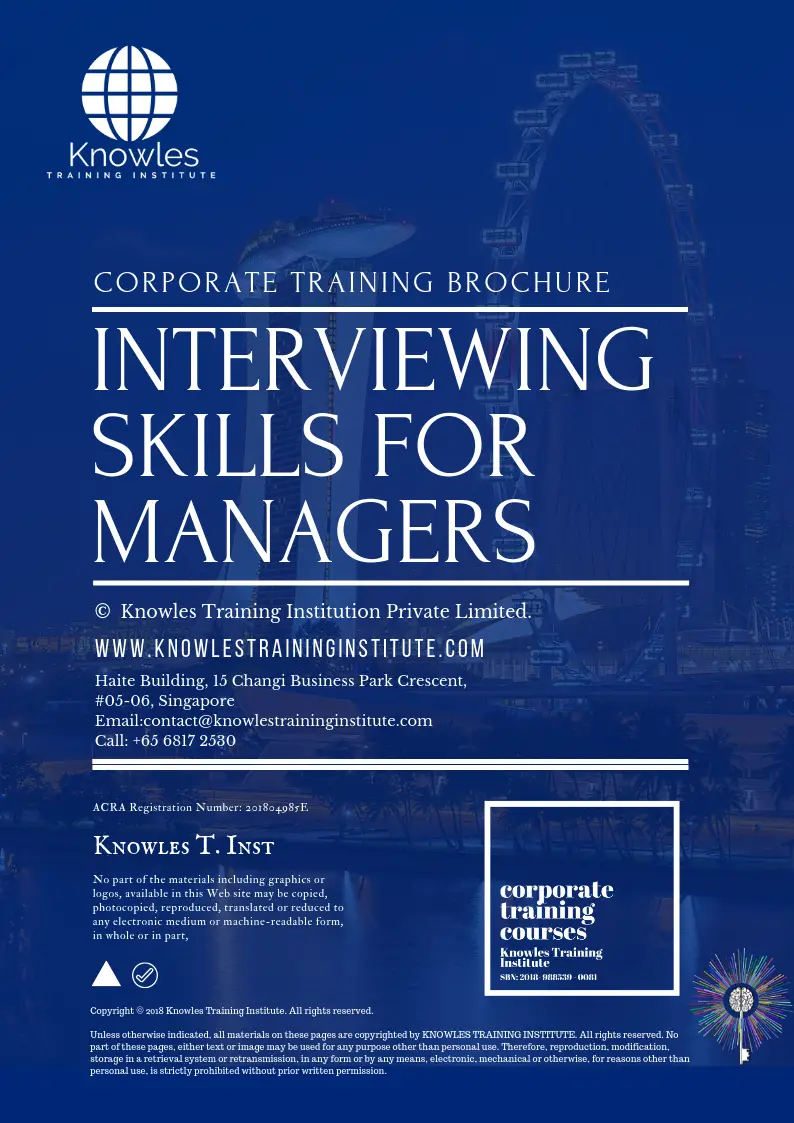
Request for this Interviewing Skills For Managers course brochure. Fill up the short information below and we will send it to you right away!
Post-Training Support: A vast majority of training does not have any effect beyond 120 days. But to work, training has to have a strong pre- and post-training component. Post-training reinforcement consequently helps individuals to recall the understanding and ask questions.
Blended Learning: Learning does not occur in the classroom. Virtually everybody prefers distinct ways of learning. Successful learning should have a multi-channel, multi-modal strategy.
We Understand The Industry: Similarly, we’ve got a profound comprehension of the business, business design, challenges, strategy and the that our participants are in and have designed the courseware to cater to their professional needs.
Course Content: Knowles Training Institute’s material is relevant, of high quality and provide specific learning outputs. As a result, Participants will leave the training course feeling as they have gained a strong understanding and will also be in a position to execute what they have learned sensibly.
Course Development — The workshop modules follow a systematic and logical arrangement. Therefore, this structure helps to ensure that the course material allows the facilitators to deliver the course in a logical arrangement. Consider the subjects as building bricks into learning, our facilitators slowly build towards a comprehensive picture of this entire topic.
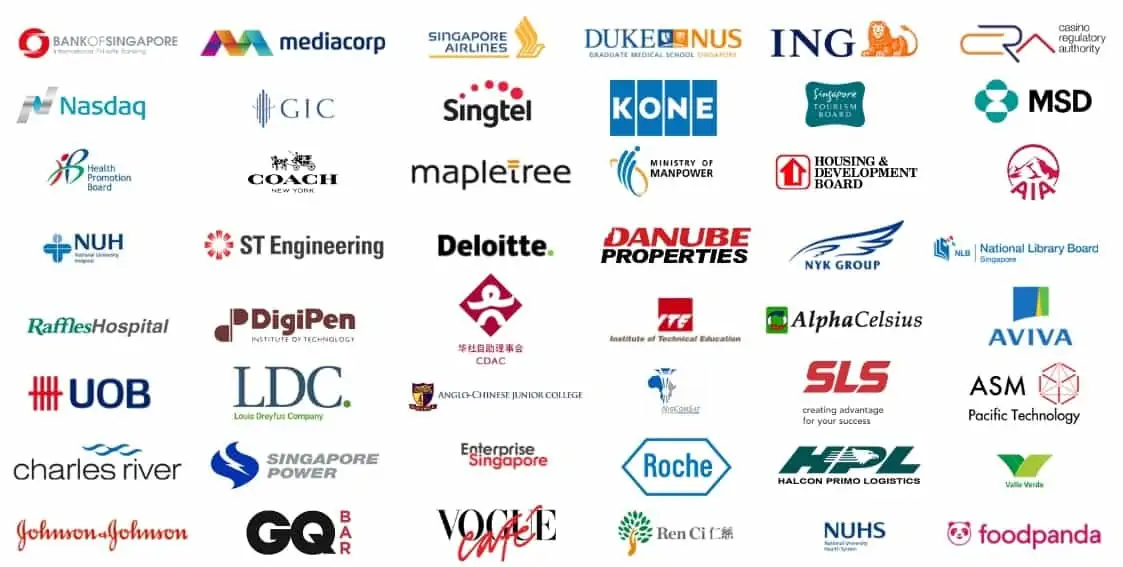

Course Enquiries

Fill up the form and we will get back to you in less than 1 working day.
Alternatively, give us a call to have one of our training consultants contact you. Our corporate training courses can be contextualized to meet your organization’s training needs. Leverage on our large pool of professional trainers and consultants for your organization’s training needs.
Office Address: 60 Paya Lebar Rd, #07-54 Paya Lebar Square, Singapore 409051
Office Phone: +65 6714 6663
Email: contact@knowlesti.sg
We Guarantee 100% Privacy. We Respect Your Privacy. Your Information Will Never Be Shared.
Questions
Tips for improving interview skills as a hiring manager:
- Do research, as there is a possibility the interviewees conducted their research on your company.
- Have appropriate body language.
- Be a great listener.
- Study how to answer follow-up questions.
- Have fun.
- Thank the interviewee.
Remember these key pointers when preparing for a Management interview.
- Concentrate on Leadership.
- Learn the Company’s Needs.
- Tailor Your Expertise.
- Provide Many Examples.
- Energy and Enthusiasm.
- Ask Relevant, Well Prepared Questions.
- Conclude the Interview.
Here are eight interview skills that will help secure a job position.
- Do background research.
- Be polite to everyone.
- Watch body language.
- Mind the words spoken.
- Review resume.
- Prepare for standard questions.
- Prepare wardrobe.
- Prepare questions.
Here are some questions to ask in an interview:
- What are you most passionate about in your job?
- What is one most significant challenge facing the company/department today?
- What skills and experiences would make an ideal candidate?
- What does victory look like here?
- What is the company’s strategy to address failure?
- What is your management style?
The top eight skills that graduate recruiters look for:
- Commercial knowledge (or business acumen) – Knowing how business and industry operates and what makes the company thrive.
- Communication.
- Teamwork.
- Negotiation and persuasion.
- Problem-solving.
- Leadership.
- Organisation.
- Perseverance and motivation.
There are three kinds of interviews: structured interviews, semi-structured interviews, and unstructured interviews. Unstructured interviews are those that take place with few interview questions – the interviewer does not have a fixed set of questions, making the interview more ‘casual’.
Here are the five Best Questions to Ask an Interviewer:
- What does the company expect from team members in this position?
- Will these expectations change over time?
- What is a typical day like at this company?
- Where will the company be in five years?
- What are the next stages in the interview process?
Here are the four best Questions one should Ask An Interviewer:
- What are the daily jobs and responsibilities of this role?
- What are the company’s values?
- What is the most enjoyable part about working at this company?
- What does success look like in this position, and how to measure it?
Remember that the team comprises of individuals who strive to reach their own goals as well as the team’s goals. Good managers must meet each team member to discover strengths and discuss how to work on weaknesses.
The STAR method is a structured method of answering to a behavioural-based interview question by examining the specific circumstance and resulting action to take with regards to the described situation.
Here are four things one should consider incorporating into an interview training:
- Interviewing as a whole subject. It is always a good idea to meet the fundamentals of interviewing so that each interviewer has identical foundational knowledge.
- Forbidden interview questions.
- Unconscious bias training.
- Candidate experience training.
There is typically a maximum of three interviewers for a candidate. This guidance is to let the candidate be at ease as they can make eye contact with each interviewer, allowing the interviewers to ascertain better if the candidate is suitable or not.
Here are eight Things one Should not Do on a Job Interview
- Have no knowledge about the company. Knowing the background of a company takes only a few minutes on the internet.
- Discussing remuneration too soon.
- Be Late (or Worse, Too Early)
- Forget Copies of Resume.
- Trash a Previous Employer.
- Lack of Enthusiasm.
- Forget to Ask Questions.
- Talk Too Much.
Four tips to make hiring managers better interviewers:
- Interview training. This tip is obvious and most effective.
- Create standard forms and processes.
- Provide scripted behavioural interview questions.
- Probe the interviewee to understand him or her better.
7 Tips on How to Interview Better
- Always Be Prepared – very important
- Rehearse Less (Avoid sounding mechanical)
- Be Extra Prepared for Phone Interviews.
- Treat Freelance Interviews like you are interviewing for a Perm job.
- Ask Follow Up Questions.
- Send a Thank You Note
- Above All, Be Honest, Be Oneself.
Choose upon participants’ roles within the panel. Study the position description before interviewing; it includes information such as preferred qualifications, job functions, and working conditions. Develop a selection matrix if desired and job-related interview questions for each interviewee.
Here is a definitive list of the most commonly asked interview questions:
- Tell me about yourself.
- What are your weaknesses?
- Why should we choose you for this job?
- What are your hobbies outside of work?
- Where do you see yourself in five years’ time?
- Why are you leaving your current position?
- What are you main strengths?
Quick Tips for Impressing the Interviewer:
- Practice.
- Wear appropriate interview attire.
- Avoid going into the interview without knowing anything.
- Get the inside scoop.
- Review the job posting.
- Check out the interviewer on LinkedIn.
- Go light on the perfume.
- Avoid moist palms.
Here are the most common interview mistakes people make:
- Arriving late.
- Looking messy or unpolished.
- Not bringing a resume.
- Showing low energy.
- Focusing too much on themselves.
- Being unprepared.
- Not having any questions.
Interviews are broken down into these five stages of the interview process:
- Introductions.
- Small Talk.
- Knowledge Gathering.
- Question/Answer.
- Concluding.


